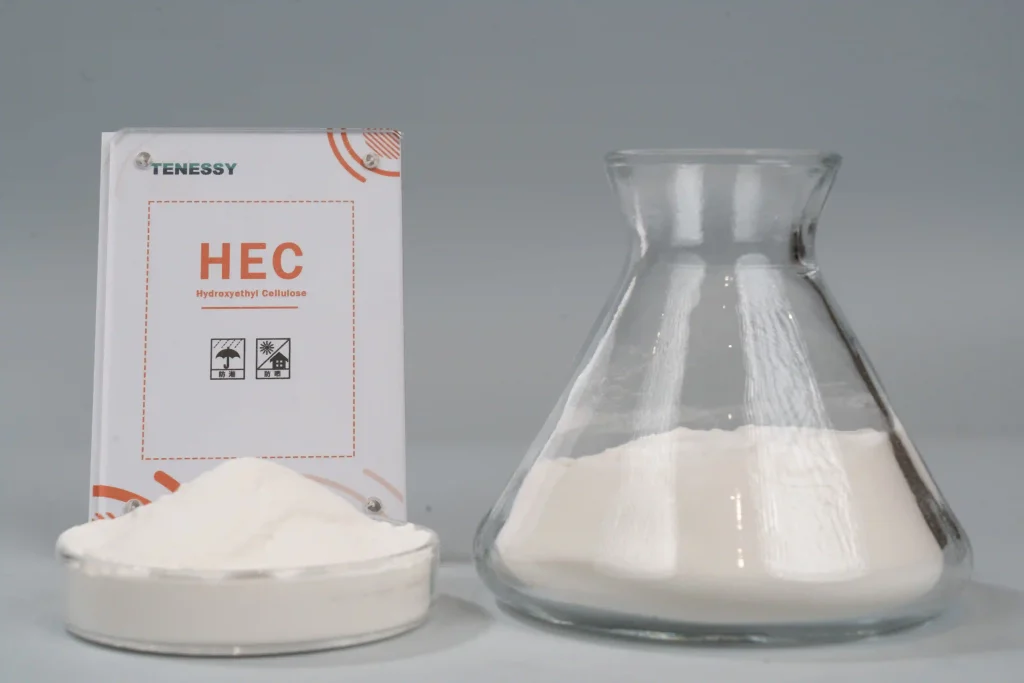¿Qué es la hidroxietilcelulosa (HEC)? Guía de usos y beneficios
Hidroxietilcelulosa -a menudo abreviada como HEC-puede sonar técnico, pero en realidad es uno de los ingredientes más utilizados en todas las industrias. Tanto si está fabricando una crema cosmética, mezclando pintura o formulando materiales de construcción, es muy probable que el HEC desempeñe un papel clave entre bastidores.
¿Qué es la hidroxietilcelulosa?
La hidroxietilcelulosa es un forma modificada de celulosa, La celulosa es la fibra natural que se encuentra en las paredes celulares de las plantas. Durante el procesado, se añaden grupos hidroxietilos a la estructura de la celulosa, lo que confiere al producto final mayor solubilidad, capacidad espesante y estabilidad.
En apariencia, el HEC suele ser un polvo blanco o blanquecino. Cuando se mezcla con agua, se hincha y forma una solución suave y espesa. Aunque comienza como un material natural, se refina químicamente para que pueda ofrecer un rendimiento constante en aplicaciones exigentes.
¿Su mayor atractivo? Versatilidad.
Desde productos de belleza hasta materiales industriales, el HEC ayuda a controlar la textura, mejorar la estabilidad y aumentar el rendimiento general.
¿Cómo funciona el CEH?
El HEC absorbe agua y se hincha, formando un gel suave y uniforme. Este gel modifica el comportamiento de los líquidos:
- Aumento de la viscosidad
- Mejorar la suspensión
- Evitar la separación
- Proporciona una mejor untabilidad
- Rendimiento duradero
Como se disuelve fácilmente en agua fría o caliente y tiene una excelente compatibilidad con sales y tensioactivos, el HEC funciona bien tanto en productos industriales como domésticos.
Características principales de la hidroxietilcelulosa
HEC destaca por varias razones importantes:
1. Excelente solubilidad en agua
El HEC se disuelve fácilmente en agua fría, sin necesidad de calentarlo. Esto lo hace conveniente para los fabricantes que desean una producción más rápida y eficiente.
2. Gran capacidad espesante
Una de las principales razones por las que los formuladores eligen el HEC es su capacidad para aumentar la viscosidad. Crea texturas suaves y consistentes en todo tipo de productos, desde champús a recubrimientos, sin alterar otras propiedades clave.
3. Gran estabilizador
El HEC ayuda a mantener los ingredientes uniformemente dispersos, especialmente en fórmulas que contienen tanto aceite como agua. Esto mejora la estabilidad del producto y evita que se separe con el tiempo.
4. Rendimiento de formación de película
El HEC puede crear una película flexible y uniforme sobre las superficies. En los productos de cuidado personal, esto contribuye a mejorar el tacto, la retención de humedad y la suavidad de aplicación.
5. Biodegradable y respetuoso con el medio ambiente
Dado que se origina a partir de celulosa vegetal, el HEC es biodegradable-una gran ventaja para las marcas que buscan fórmulas más sostenibles.
Estas ventajas hacen que HEC sea una elección acertada en los sectores cosmético, farmacéutico, de la construcción y muchos otros.
¿Para qué se utiliza la hidroxietilcelulosa?
HEC es increíblemente polivalente. Estas son algunas de sus principales aplicaciones:
1. Productos de cuidado personal
Encontrará HEC en lociones, champús, acondicionadores, cremas, geles y mucho más.
Mejora:
- Espesor
- Textura suave
- Estabilidad del producto
- Sensación de aplicación
Ayuda a crear esa consistencia rica y sedosa que esperan los consumidores.
2. Productos farmacéuticos
En las formulaciones de fármacos, el HEC se utiliza comúnmente como:
- Una carpeta
- Un espesante
- Un gelificante
Su capacidad para retener la humedad lo hace útil para geles tópicos, colirios, comprimidos y medicamentos de liberación sostenida.
3. Industria alimentaria
El uso de HEC está autorizado en muchos aplicaciones alimentarias. Los fabricantes la utilizan para mejorar:
- Textura
- Sensación en boca
- Estabilidad
Aparece en salsas, aderezos, productos horneados y bebidas.
4. Materiales de construcción
HEC desempeña un papel importante en el sector de la construcción, especialmente en:
- Cemento
- Mortero
- Adhesivos para baldosas
- Productos de yeso
Aumenta la trabajabilidad, evita el descolgado y mejora la fuerza de adherencia, haciendo que las mezclas sean más fáciles de aplicar y más duraderas.
5. Pinturas y revestimientos
El HEC ayuda a ajustar la viscosidad de pinturas y revestimientos para que se extiendan más uniformemente y resistan el goteo. También estabiliza los pigmentos, garantizando un color y un acabado uniformes.
6. Productos domésticos y de limpieza
Muchos detergentes y limpiadores líquidos utilizan HEC para mejorar el espesor y el rendimiento. Ayuda a que las fórmulas se mantengan uniformes y facilita su dosificación y uso.
¿Por qué elegir HEC?
HEC destaca porque lo es:
- No tóxico y seguro
Derivado de la celulosa natural, por lo que es adecuado para aplicaciones de cuidado personal y en contacto con alimentos (dependiendo del grado).
- Espesador de alta eficacia
Incluso pequeñas cantidades proporcionan un fuerte poder espesante.
- Tolerante a la sal y estable
Funciona bien incluso en sistemas que contienen electrolitos o tensioactivos.
- Fácil de disolver
Los modernos grados HEC hidratan rápida y uniformemente.
- Versátil en todos los sectores
Funciona en todo, desde el mortero de cemento hasta el champú.
Conclusión
La hidroxietilcelulosa es un ingrediente verdaderamente polivalente que aporta estructura, estabilidad y rendimiento a una amplia gama de productos. Su facilidad de uso, biodegradabilidad y comportamiento constante la convierten en una opción fiable para formuladores de todos los sectores.
Tanto si se trata de desarrollar una crema cosmética como de mejorar un revestimiento o una mezcla de mortero, el HEC proporciona resultados fiables.
Proveedor de hidroxietilcelulosa
¿Busca una fuente fiable de CEH de alta calidad?
Tenessy ofrece hidroxietilcelulosa de calidad superior adaptada a diversos sectores. Nos centramos en ofrecer un rendimiento constante y un servicio fiable.
Por qué los clientes eligen TenessyHEC:
- Calidad estable - Cada lote se somete a pruebas para cumplir normas estrictas.
- Grados personalizados - Podemos adaptarnos a sus necesidades de viscosidad o aplicación.
- Conocimientos técnicos - Décadas de experiencia en química de la celulosa.
- Capacidad de suministro mundial - Envíos rápidos y fiables a todo el mundo.
Tanto si su objetivo es mejorar la textura como aumentar la estabilidad o el rendimiento,
Tenessy HEC ofrece los resultados que espera.
Deje que Tenessy le ayude a mejorar su formulación con hidroxietilcelulosa de primera calidad y un servicio técnico completo.
Preguntas frecuentes
1. ¿Es perjudicial la hidroxietilcelulosa?
En general, el HEC se considera seguro y no tóxico cuando se utiliza según las indicaciones. A la mayoría de las personas no les causa irritación. Como ocurre con cualquier ingrediente, un pequeño número de personas puede ser sensible a él, por lo que siempre es recomendable realizar una prueba epicutánea con los nuevos productos para el cuidado de la piel.
2. ¿Es la hidroxietilcelulosa segura para la piel?
Yes-HEC se utiliza ampliamente en productos cosméticos y para el cuidado de la piel. Es suave, estable y adecuado incluso para pieles sensibles. Si tiene alguna preocupación específica, siempre se recomienda consultar a un dermatólogo.









